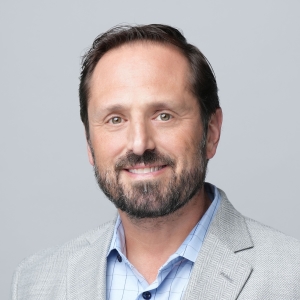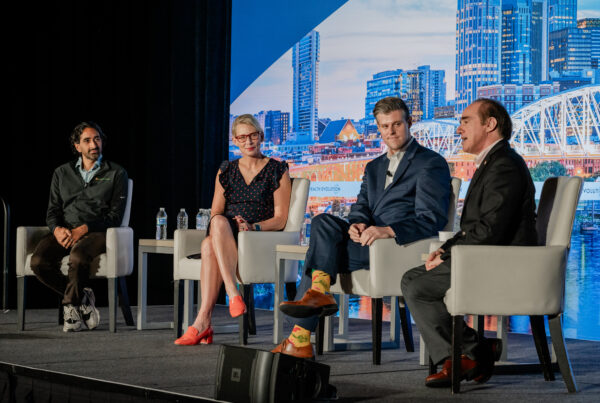Gabe Stein, CEO of ECLAT, brings an impressive track record of over 20 years in spearheading digital transformation solutions for health care companies, with a strong focus on enhancing patient care and fostering organizational growth. His strong acumen and genuine passion for technology enablement have been instrumental in significantly improving operational efficiency and elevating the overall quality of care.
A key aspect of Mr. Stein’s contributions lies in the deployment and delivery of SaaS integrations, which have revolutionized revenue cycle management for health care organizations, benefitting both payers and providers while generating new revenue streams.
Before joining ECLAT, Mr. Stein served in the U.S. Army Reserves and the U.S. Coast Guard. As the former CEO of A Peak Health Solutions (which was sold to AMN), he played a pivotal role in driving innovation in mid-revenue cycle and risk adjustment solutions. He has spent the last several years pivoting service companies into technology enabled solution companies and helping them move from provider services into value-based care.
The decision to join ECLAT was inspired by the company’s vision and groundbreaking achievements in the health care industry. Health Evolution had the opportunity to sit down with him to delve into these groundbreaking accomplishments, providing insights into the future of RCM solutions that promise to improve patient outcomes and health care systems’ financial success.
What inspiration fuels ECLAT?
ECLAT which means “Brilliance” in French, was originally started by a small team in Virginia led by Karthik Polsani with a clear vision of becoming an industry leader in complex medical coding, particularly inpatient coding for hospitals, delivering superior cost-effective and high-quality care. ECLAT, along with their leadership team are dedicated to offering the best solutions in global inpatient coding.
At its inception, the market lacked comprehensive medical coding and revenue cycle solutions. ECLAT’s core mission has been to optimize coding processes and expand into revenue cycle management and value-based care. Over time, ECLAT has evolved from a coding company into a global enterprise offering Revenue Cycle Services and Value-based Care solutions, with a focus on risk adjustment. The company has transitioned from a BPO shop to a technology-driven entity, offering a Software-as-a-Service (SaaS) platform.
While it might sound like a cliché, the driving force behind ECLAT’s success is our customers and commitment to delivering exceptional products and services.
Why was it appealing to come to ECLAT?
The company’s unwavering commitment to excellence around delivery and customer satisfaction. Starting from its founders and extending to the entire team, ECLAT has nurtured a culture that prioritizes client satisfaction above all else. Through a cohesive approach that harmonizes onshore and offshore resources, the ECLAT team has solidified its position as a trusted partner for health care organizations seeking reliable solutions. ECLAT’s remarkable growth trajectory speaks volumes about its robust foundation, innovative practices, unwavering integrity, and steadfast partnerships.
What should prospective clients expect in the next 18 months? The next 2-3 years?
ECLAT remains committed to its core business in BPO services for providers and payers, emphasizing automation, tools, and a skilled workforce to enhance efficiency and foster company growth, while meeting the needs of our clients. Our dedication to coding remains our focus as we venture into new sectors. A significant area for us is value-based care and solutions tailored to government payers and providers, who bear the risk. Leveraging advanced technology such as NLP and ML, we ensure accurate documentation capture, both concurrently and retrospectively, thereby securing appropriate risk scores. Recently, we proudly introduced our exclusive technology platform, Evaire, and we are eager to continue driving innovative solutions in this domain.
How has technology evolved in health care and what role does it play in the future of health care?
The health care industry has traditionally embraced technological advancements, at a slower pace compared to other sectors. we see that mindset rapidly changing which I believe was pushed forward both by Covid and more professionals from other industries getting involved in health care. Health care is now witnessing the growing influence of business intelligence and automation, which is making significant contributions to various aspects of care delivery and revenue cycle management.
The integration of AI/ML technologies is particularly noteworthy, as they aid in diagnosing conditions accurately and identifying trends that can improve patient care beyond the medical realm. At ECLAT, our focus centers on leveraging AI, ML and NLP for clinical documentation review, ensuring precise and timely capture of diagnoses both in real-time and retrospectively. While our primary objective is to enhance code accuracy and quality, these advancements may also lead to increased productivity.
How do you find the right people for the job?
Both at the leadership level and within our delivery centers, we must exhibit a willingness to invest in training, mentoring, and providing the necessary tools to support our staff and foster their desire to remain with us.
Within our industry, particularly in revenue cycle and coding, there is a shortage of domestic talent. To address this issue, we need to broaden our search globally while also nurturing talent domestically, especially in areas where we may have reservations about utilizing global resources. Since the COVID-19 pandemic, we have seen a surge in labor costs due to inflation, and it seems that the talent pool has shrunk. This further emphasizes the significance of leveraging technology, flexible work from home offices to explore avenues for reducing resources.
Which accomplishments are you, as a CEO, most proud of?
As the CEO, I take immense pride in upholding and advancing the vision and culture set forth by ECLAT’s founders. Expanding our team with individuals who align with our core values enhances our competitiveness against larger companies. The company’s exponential growth and the ability to build talented teams has attributed to the strong foundation laid by the company.
A crucial milestone in our journey was the partnership with Karthik and Sneha, the founders of ECLAT. Rather than replacing anything, this collaboration enriched our leadership, management, and expertise. Working alongside a private equity company has amplified our competitiveness, enabling us to compete with larger players in the industry effectively.
One aspect that truly has been remarkable to witness has been the successful integration of new leadership across various areas while preserving our culture.
Investing in technology and implementing significant changes, such as building and launching a technology platform, is undoubtedly challenging. It becomes even more demanding when striving to maintain focus and continuity in ongoing operations. However, our team has successfully accomplished this. We have introduced new service lines and cutting-edge technology for our customers, enhancing both their experiences and internal efficiencies.
What is the most difficult challenge you have overcome on the road to success?
I firmly believe that we are on the right trajectory. Overcoming obstacles, such as implementing new service lines, advanced technology, and venturing into new directions within an established company culture, has been pivotal. Throughout this journey, effective communication and shared objectives have played a fundamental role in driving our company’s growth.
What advice would you give to other CEOs?
As a leader, it is not necessary to be the smartest person in the room; rather, it is crucial to surround ourselves with the right individuals whom we can trust to help us achieve our goals.
I believe we must embrace technology, navigate through challenges, and lead with both wit and intelligence to shape the future of health care.










